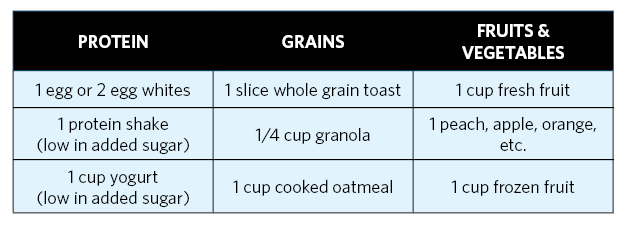Building a Balanced Breakfast
View All Section Pages
The benefits of eating breakfast outweigh not eating breakfast. In one study, breakfast eaters, compared to breakfast skippers, were more likely to have a decreased appetite, improved sleep quality and an overall improvement in healthy food choices. The study also found that skipping breakfast negatively impacted blood sugar and insulin control in the body. Starting your day with a healthy meal kick-starts your metabolism and provides you with a boost of energy.
Building Blocks of a Healthy Breakfast
To build a healthy breakfast, consider the following food groups:
- Protein
- Dairy
- Grains
- Fruits and vegetables
A balanced breakfast provides you with energy needed for your morning and will help you feel full longer.
Protein
A high-protein breakfast is shown to benefit muscle mass gain, increase energy expenditure, improve glucose regulation, decrease the desire to snack at night and increase satiety hormones—all of which support weight loss. Prioritize lean proteins such as eggs, protein shakes, peanut butter, low-fat dairy products and smoothies containing protein.
Dairy
Another common food category to consume at breakfast is dairy. Adding Greek yogurt, cottage cheese, low-fat or skim milk and low-fat cheese can help increase your daily calcium and provide protein. Stick with reduced fat dairy products to limit your saturated fat intake.
Added sugars are an important consideration concerning yogurts. According to the 2020-2025 Dietary Guidelines for Americans, added sugars should make up no more than 10% of your daily caloric intake. Many yogurts offer low-sugar or even zero-sugar options. As a rule of thumb, select yogurts with 5 grams or less of added sugar per serving.
Grains
When planning grains at breakfast, consider whole grains and those high in fiber. Fiber can help lower LDL cholesterol, improve blood sugar management, regulate appetite, support weight management and improve overall digestive health. Women are recommended to consume at least 25 grams of fiber/day and men consume at least 38 grams of fiber/day. Examples of high-fiber breakfast grains include whole grain breads and cereals and oats.
Fruits and Vegetables
Fruits and vegetables can provide a great source of fiber for breakfast as well. Include one piece of fruit or one cup of chopped fruit or berries on yogurt, cereal or a la carte. Though vegetables are not a common go-to at breakfast, add vegetables such as carrots and spinach to smoothies or make a veggie omelet.
Build Your Own Balanced Breakfast
Keep these recommendations in mind when creating a healthy breakfast that fits your nutritional needs and morning schedule. For dietitian-approved breakfast recipe ideas, visit our Recipes section. Also, use the table below to mix and match one item from each category to build your own balanced breakfast.

To schedule a one-on-one consultation with a Cooper Clinic Registered Dietitian Nutritionist to build healthy eating patterns or learn more about Cooper Clinic Nutrition, visit cooperclinicnutrition.com or call 972.560.2655.
Article provided by Elizabeth Culpepper, Texas A&M University Dietetic Intern, and Cooper Clinic Nutrition.